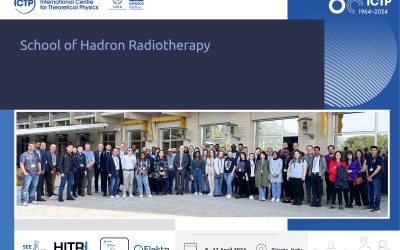Registration is now open for the 16th Seminar of HITRIplus – “Prospects of proton beam range monitoring and hypoxia assessment with modular J-PET scanner“, scheduled for March 19 (from 17:00 to 18:00). The seminar will be given by Pawel Moskal.
Jagiellonian PET (J-PET) is a novel cost-effective positron emission tomography technology based on plastic scintillators. It allows for the construction of modular, lightweight, and portable PET scanners. J-PET enables monitoring of the proton beam range through the imaging of positron-emitting isotopes created in the patient’s body during proton therapy. Moreover, the J-PET prototype constructed at the Jagiellonian University is the first scanner enabling multi-photon imaging, positronium imaging and quantum entanglement imaging via measurement of photons’ polarization. Positronium is an exotic atom composed of an electron from tissue and the positron emitted by the radionuclide, and it may be formed in human tissues in the intramolecular spaces. In living organisms, about 40% of positron annihilations occur through the creation of positronium. The positronium lifetime in the patient’s body is sensitive to the nanostructure and metabolism of human tissues. It is also sensitive to the concentration of oxygen molecules. Therefore, positronium is considered a possible biomarker of hypoxia. In the talk, the first applications of modular J-PET scanner for proton beam monitoring will be presented. The talk will include also the presentation of the pilot clinical applications of the J-PET scanner for standard PET imaging as well as for positronium imaging. We will also present arguments demonstrating that J-PET opens perspectives for the application of positronium as a biomarker for in-vivo assessment of the degree of hypoxia in PET imaging as well as in the monitoring of hadron therapy.
Pawel Moskal, Ph.D. is an inventor of cost-effective positron emission tomography based on plastic scintillators and the method of positronium imaging. He is Professor of physics and the head of the Department of Particle Physics and Applications at the Jagiellonian University in Cracow, Poland. He won the Prime Minister’s award for his doctoral dissertation in 1999 and a Gold Medal for the invention of the matrix device for Positron Emission Tomography at Brussels Innova 2009. Prof. Moskal has co-authored 42 patents in Europe, USA and Japan, and more than 450 scientific articles in the field of nuclear and particle physics and positron emission tomography. He is leading the J-PET collaboration, an international and interdisciplinary research team at the Jagiellonian University. Prof. Moskal was awarded many prizes including the Prime Minister Medal for Merit for Invention and Minister of Education and Science Award for significant achievements in the implementation of inventions. He received also the Minister of Science and Higher Education Award for outstanding achievements in educational and scientific supervision.
For more information: https://indico.cern.ch/event/1391132/







